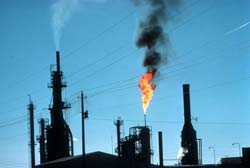A greater number of large “planetary sized waves” in the atmosphere that move from the lower atmosphere into the upper atmosphere were responsible for the smaller Antarctic ozone hole this fall, according to NASA researchers. The September 2002 ozone hole was half the size it was in 2000. However, scientists say that these large-scale weather patterns in the Earth’s atmosphere are not an indication that the ozone layer is recovering.
Paul Newman, a lead researcher on ozone at NASA’

Researchers at the National Center for Atmospheric Research (NCAR) and other institutions have pinpointed the locations of high concentrations of air pollutants around the world by combining data from four satellite imaging systems. Their findings are being presented this week in San Francisco at the annual meeting of the American Geophysical Union (AGU).
The researchers used information from instruments on NASA and European Space Agency satellites to measure atmospheric levels of three typ
Management of Pacific Salmon has been an issue for years. To determine whether management goals are working, knowledge of historical populations can prove quite useful. In a recent study published in Ecology, Deanne C. Drake, Robert J. Naiman, and James M. Helfield, all of the University of Washington, paired annual tree ring growth with catch data to determine what salmon stocks looked like 200 years ago.
Born in freshwater lakes and rivers, salmon swim to the ocean where they feed and matu
Four annual mass treatments of single doses of safe and inexpensive drugs found effective
Researchers report in the December 5 issue of the New England Journal of Medicine reaching an important milestone in learning how to halt a major mosquito-borne disease affecting 120 million people around the world. The disease, called lymphatic filariasis and commonly known as elephantiasis, is a leading cause of physical disfigurement, social ostracism, and economic loss throughout Africa, Asia
The direct injection of unwanted carbon dioxide deep into the ocean is one suggested strategy to help control rising atmospheric carbon dioxide levels and mitigate the effects of global warming. But, like the problems associated with the long-term storage of nuclear waste, finding a safe place to sequester the carbon may be more difficult than scientists first anticipated.
Because the atmosphere interacts with the oceans, the net uptake of carbon dioxide and the oceans’ sequestration capac
A totally new and highly controversial theory on the origin of life on earth, is set to cause a storm in the science world and has implications for the existence of life on other planets. Research* by Professor William Martin of the University of Dusseldorf and Dr Michael Russell of the Scottish Environmental Research Centre in Glasgow, claims that living systems originated from inorganic incubators – small compartments in iron sulphide rocks. The new theory radically departs from existing perception